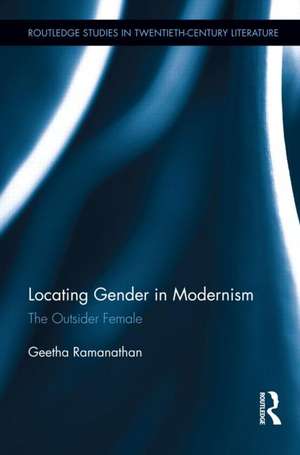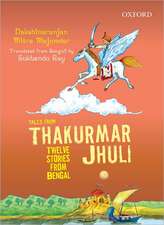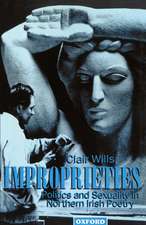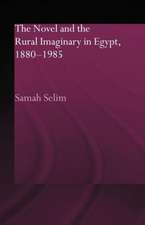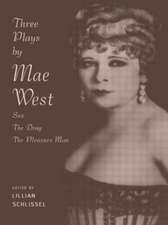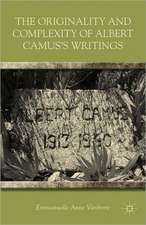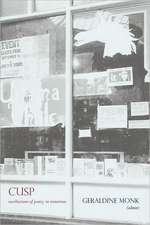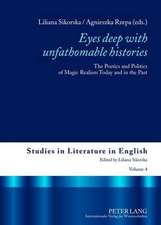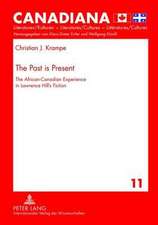Locating Gender in Modernism: The Outsider Female: Routledge Studies in Twentieth-Century Literature
Autor Geetha Ramanathanen Limba Engleză Hardback – 9 mai 2012
| Toate formatele și edițiile | Preț | Express |
|---|---|---|
| Paperback (1) | 363.00 lei 43-57 zile | |
| Taylor & Francis – 3 mar 2016 | 363.00 lei 43-57 zile | |
| Hardback (1) | 1058.43 lei 43-57 zile | |
| Taylor & Francis – 9 mai 2012 | 1058.43 lei 43-57 zile |
Din seria Routledge Studies in Twentieth-Century Literature
-
 Preț: 311.41 lei
Preț: 311.41 lei -
 Preț: 310.96 lei
Preț: 310.96 lei -
 Preț: 302.95 lei
Preț: 302.95 lei -
 Preț: 310.60 lei
Preț: 310.60 lei -
 Preț: 170.28 lei
Preț: 170.28 lei -
 Preț: 310.70 lei
Preț: 310.70 lei - 18%
 Preț: 706.91 lei
Preț: 706.91 lei -
 Preț: 446.37 lei
Preț: 446.37 lei -
 Preț: 482.78 lei
Preț: 482.78 lei -
 Preț: 277.17 lei
Preț: 277.17 lei - 15%
 Preț: 210.15 lei
Preț: 210.15 lei - 18%
 Preț: 1056.32 lei
Preț: 1056.32 lei - 18%
 Preț: 1058.38 lei
Preț: 1058.38 lei -
 Preț: 446.32 lei
Preț: 446.32 lei - 18%
 Preț: 999.98 lei
Preț: 999.98 lei - 18%
 Preț: 1052.35 lei
Preț: 1052.35 lei -
 Preț: 305.67 lei
Preț: 305.67 lei - 18%
 Preț: 1053.16 lei
Preț: 1053.16 lei -
 Preț: 430.96 lei
Preț: 430.96 lei - 18%
 Preț: 1109.18 lei
Preț: 1109.18 lei - 18%
 Preț: 1115.33 lei
Preț: 1115.33 lei - 18%
 Preț: 1060.19 lei
Preț: 1060.19 lei - 18%
 Preț: 1058.10 lei
Preț: 1058.10 lei -
 Preț: 444.51 lei
Preț: 444.51 lei - 18%
 Preț: 1056.14 lei
Preț: 1056.14 lei -
 Preț: 441.74 lei
Preț: 441.74 lei - 18%
 Preț: 1058.79 lei
Preț: 1058.79 lei - 18%
 Preț: 1057.40 lei
Preț: 1057.40 lei - 18%
 Preț: 1062.26 lei
Preț: 1062.26 lei -
 Preț: 429.23 lei
Preț: 429.23 lei -
 Preț: 463.62 lei
Preț: 463.62 lei - 18%
 Preț: 1053.92 lei
Preț: 1053.92 lei - 18%
 Preț: 1118.46 lei
Preț: 1118.46 lei - 18%
 Preț: 1115.33 lei
Preț: 1115.33 lei - 26%
 Preț: 820.73 lei
Preț: 820.73 lei - 18%
 Preț: 1114.98 lei
Preț: 1114.98 lei - 18%
 Preț: 1163.19 lei
Preț: 1163.19 lei - 18%
 Preț: 1054.10 lei
Preț: 1054.10 lei - 18%
 Preț: 1103.85 lei
Preț: 1103.85 lei -
 Preț: 415.25 lei
Preț: 415.25 lei
Preț: 1058.43 lei
Preț vechi: 1290.78 lei
-18% Nou
Puncte Express: 1588
Preț estimativ în valută:
202.59€ • 220.14$ • 170.29£
202.59€ • 220.14$ • 170.29£
Carte tipărită la comandă
Livrare economică 21 aprilie-05 mai
Preluare comenzi: 021 569.72.76
Specificații
ISBN-13: 9780415509701
ISBN-10: 041550970X
Pagini: 216
Ilustrații: black & white illustrations
Dimensiuni: 152 x 229 x 15 mm
Greutate: 0.56 kg
Ediția:1
Editura: Taylor & Francis
Colecția Routledge
Seria Routledge Studies in Twentieth-Century Literature
Locul publicării:Oxford, United Kingdom
ISBN-10: 041550970X
Pagini: 216
Ilustrații: black & white illustrations
Dimensiuni: 152 x 229 x 15 mm
Greutate: 0.56 kg
Ediția:1
Editura: Taylor & Francis
Colecția Routledge
Seria Routledge Studies in Twentieth-Century Literature
Locul publicării:Oxford, United Kingdom
Public țintă
Postgraduate and UndergraduateCuprins
Introduction 1: The Female Outsider in the Modern 2: Modernisms and the Woman in History 3: Figuring the Female in Modern Realisms 4: Magical Women in the Modern 5: Modern Women in Feminist Realisms Conclusion
Descriere
This book visits modernism within a comparative, gendered, and third-world framework, questioning current scholarly categorisations of modernism and reframing our conception of what constitutes modernist aesthetics. It describes the construction of modernist studies and argues that despite a range of interventions which suggest that philosophical and material articulations with the third world shaped modernism, an emphasis on modernist "universals" persists. Ramanathan argues that women and third-world authors have reshaped received notions of the modern and revised orthodox ideas on the modern aesthetic. Authors such as Bessie Head, Josiane Racine, T.Obinkaram Echewa, Raja Rao, Gabriel Garcia Marquez, Sembene Ousmane, Salman Rushdie, Ana Castillo, Attia Hossain, Bapsi Sidhwa, and Sahar Khalifeh, are visited in their specific cultural contexts and use some form of realism, a mode that western modernism relegates to the nineteenth century. A comparative methodology and extensive research on intersecting topics such as post-coloniality and the articulation between gender and modernist aesthetics facilitates readings of the modern in twentieth century literature that fall outside standards of western modernism. Considering the relationship between aesthetics and ideology, Ramanathan lays out a critical apparatus to enhance our understanding of the modern, thus suggesting that form is not universal, but that the history of forms, like the history of colonialism and of women, indicates very specific modalities of the modern.
